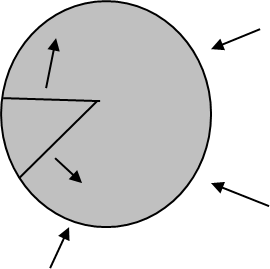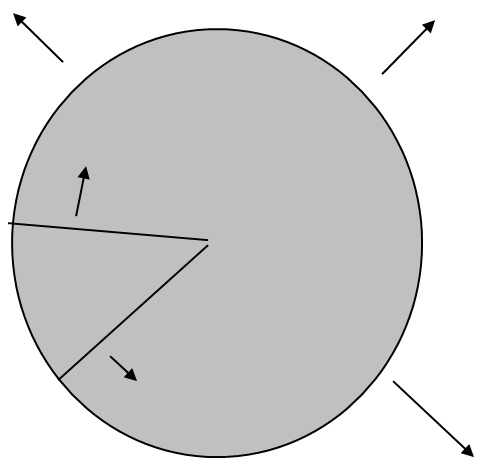
The zero-sum barrier is the obstacle to social synergy. Game theory differentiates between zero-sum and non-zero-sum interactions. In games like poker, my gain is your loss so I win at your expense. Essentially, everyone fights, and the winner takes all. If you imagine a reward “pie”, a zero-sum game involves taking another’s slice, to increase your share at the other’s expense. When nations go to war this is the goal, but taking another’s land often involves a war that lays waste to industry, infrastructure and resources, e.g. Hitler conquered Europe but the process left it in ruins. So in zero-sum interactions, getting the other’s slice also shrinks the whole pie (Figure 5.3a). If we all fight, we all become poor, as dog-eat-dog societies evidence.
In contrast, in non-zero-sum interactions the goal is to increase the whole pie including my slice, as in team games where if the team wins we all win. Fair trade is a non-zero-sum interaction that allows both parties to win. So synergy works by increasing the shared pie for all, making every slice larger (Figure 5.3b).
Non-zero-sumness is an unpleasant term, but the argument that achieving it is the secret to human prosperity is a strong one (Wright, 2001). Every society has had to face the challenge of how to overcome the zero-sum barrier: the tendency of its citizens to defect on social synergy. Our extraordinary success as a race can be attributed not to our intelligence but to our social ability to work together to achieve synergy gains. Humanity alone, among all the intelligent life on earth, by being ultra-social, overcame the zero-sum barrier.

Overcoming the zero-sum barrier is also important in socio-technical systems, as to enable synergies they have to deny defections. While traditional word processing software just has to increase individual performance, socio-technical systems must also increase community synergies and defend against anti-social defections. If users just followed Rule 1, systems like Wikipedia would not work, as no one would give to others for no gain. If people just followed Rule 2 like ants, these systems would not need defenses against defections, but this is not the case.
Synergy occurs in forums like AnandTech, where if anyone in a group solves a problem then everyone gets the answer. The larger the group, the more likely someone can solve in seconds a problem you might take days to solve. Likewise in online security, if one person gets a virus and the community comes up with a cure then everyone can get protection. Same again functions let Amazon readers tap into the experiences of others, to find books bought by those who bought the book they are looking at now. Wikipedia users correct errors of fact, supply references and offer examples for everyone. Table 5.5 shows how various socio-technologies increase synergy and reduce defections.
Table 5.5 Synergies and defections in online systems
|
Purpose |
Examples |
Synergy |
Defection |
|
Communicate |
Email, Chat, ListServ, IM |
Communication. Send useful messages |
Spam. Spammers require spam filters |
|
Learn |
Moodle, Blackboard |
Share learning: Pupils help others learn |
Plagiarism. Students copy (turnitin.com) |
|
Know |
Wikipedia, Tiddlywiki |
Share knowledge. Tap group knowledge |
Trolls. Wikipedia monitors “trolls” |
|
Friend |
Facebook, Myspace, Bebo |
Relationships. Relate to friends, family |
Predation: Social networks banish predators |
|
Keep current |
Digg, Del.icio.us |
Share bookmarks: Show online trends |
Advocates: Mark their own web sites |
|
Play |
Second Life, The Sims, MP games |
Shared play. People interact in a virtual world |
Bullies/Thieves. Rob newbies who need “safe” areas |
|
Trade |
E-Bay, Craig’s List, Amazon |
Item trading. People trade more goods |
Scams. Reputation systems cut scams |
|
Work |
Monster |
Job trading: People find and offer work better |
Faking. Padded CVs and fake job offers |
|
Download |
Webdonkey, Bit-Torrent |
Shared down-loading: Groups share download work |
Piracy. Prosecution by society’s copyright laws. |
|
Publish |
Flickr, YouTube |
Share viewing: Share photo and video experiences |
Offensiveness: Editors remove items that offend. |
|
Advice |
Help boards like AnandTech |
Share advice: People help others solve problems |
Confusers. People put old questions in new threads |
|
Discuss |
Slashdot, Boing-Boing |
Shared views. People comment and share opinions |
Caviling: Karma systems deselect negativity |
|
Follow |
|
Links leaders and followers |
Identity theft. A persona is hijacked |